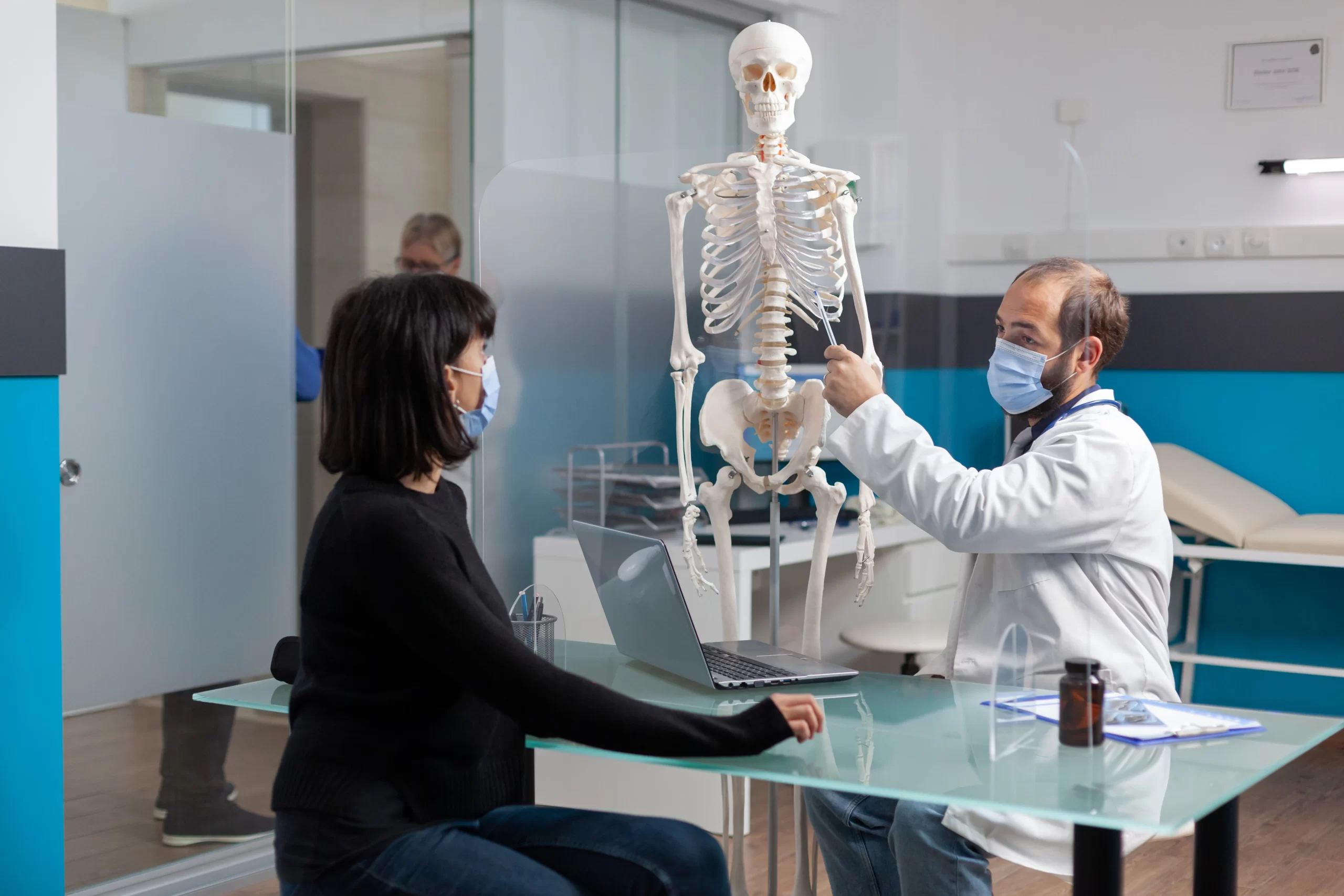
Keep in mind that osteoarthritis, the most common form of arthritis that also affects the joints and is one of the most commonly treated disorders by rheumatologists, is not the same as rheumatoid arthritis.
Dr. Qaiser Usmani explains that the joint discomfort associated with osteoarthritis is caused by wear and tear in joints and ligaments. “Mechanical degeneration, which is linked to age, injury, or repeated stress, frequently affects one or a few joints.” “Rheumatoid arthritis, on the other hand, is characterized by systemic inflammation that results in severe swelling in joints throughout the body.”
When ought one to consult a rheumatologist?
As the name implies, systemic autoimmune disorders can affect various body parts and organs, resulting in a wide range of symptoms.
“They cover a wide range of disorders that can impact numerous organ systems, including your musculoskeletal system, skin, kidneys, lungs, nervous system, and more,” says Dr. Qaiser Usmani, “with the joints being the most commonly afflicted.” You will have symptoms, particularly “wherever the immune system is targeting.”
Systemic autoimmune diseases are characterized by the following signs and symptoms:
- Pain, stiffness, or swelling in more than one joint
- Fatigue
- Generalized weakness
- Skin rashes or lesions
- Hair loss
In this case, a routine blood test panel looking for inflammation-related markers will most likely be requested. Your doctor will then decide whether you should be referred to a rheumatologist for additional testing.
Finding a Rheumatologist for You
Do you believe you have rheumatoid arthritis? You should go to the rheumatology clinic. SNS Rheumatology can help you find a top-rated rheumatologist in Lakewood and Hamilton, New Jersey.
What does place at the initial consultation with a rheumatologist?
During your initial consultation, your rheumatologist will most likely request a battery of tests to help pinpoint and rule out any potential causes of your symptoms. These tests could include everything from extensive blood testing to X-rays.
If you experience any of these symptoms, first consult your primary care physician.
“Your doctor can help determine whether a symptom, such as glenohumeral joint osteoarthritis, is non-inflammatory and thus more likely to be caused by osteoarthritis, or if it is accompanied by other systemic symptoms that may signal an inflammatory or autoimmune disorder,” Dr. Qaiser Usmani explains.
Dr. Qaiser Usmani claims that blood tests may enable us to make a diagnosis and provide us with a clear understanding of what is occurring within the body.
Blood tests, on the other hand, may not always be able to pinpoint the exact cause of systemic symptoms.
According to Dr. Qaiser Usmani, fibromyalgia is a diagnosis of exclusion. These patients have widespread, chronic joint pain, but their inflammatory workup is negative, so the diagnosis is clinical rather than blood-test based.
How are autoimmune diseases like arthritis treated by rheumatologists?
If you have been diagnosed with a rheumatic condition, you should consult with a rheumatology specialist. Rheumatology consultants may recommend various options to reduce the inflammation caused by your immune system as part of your treatment.
Rheumatology consultants may recommend plasma rich platelet injection therapy in addition to steroids and immunomodulatory drugs as mainstays for treating these disorders. Topical analgesics and over-the-counter anti-inflammatory drugs such as ibuprofen and acetaminophen may also be used to treat symptoms.
However, in the case of advanced or severe disorders, it may be necessary to use immune-suppressing medications.
If you have relatives who suffer from autoimmune or rheumatic diseases.
Although not all rheumatic diseases are inherited, certain disorders may be more likely to affect you if you have a specific gene combination and the appropriate environmental triggers. The study of identical and non-identical twins has yielded a wealth of information on this topic.
For example, the HLA-B27 gene has been linked to ankylosing spondylitis (AS). Only 7% of the general population carries the gene, whereas more than 90% of white AS patients do. According to ACR, only 5% of those who carry this gene will develop the condition.
However, first-degree relatives of AS patients who carry the HLA-B27 gene have a 20% chance of developing the disease as well; this risk is most likely caused by environmental factors as well as other genes they may have inherited.
White RA patients have the HLA-DR4 gene in 60% to 70% of cases, compared to 30% of the general population. Because RA affects 12% to 15% of identical twins and 4% of non-identical twins in Twin studies, and first-degree relatives of RA patients have a disease risk of 0.8% versus 0.5% in the general population, it is likely due to environmental factors rather than genetics.
Having a lupus family member may increase risk in more ways than one. One study found that 8% of lupus patients had at least one first-degree relative with the disease, compared to 0.08% of the general population. A twin study found that identical twins had a 24% recurrence rate of SLE compared to 2% for non-identical twins, implying that genetic and environmental factors may play a role in this illness.
If You Suspect Something is Wrong
Everybody feels pain from time to time. It can be caused by a variety of factors, each person experiences it differently, and it is frequently impossible to predict when it will disappear. But if something doesn’t feel right, especially if you can’t pinpoint the source of your discomfort or if it isn’t improving with over-the-counter medication, trust your instincts.
Viscosupplementation injections may be part of your treatment plan, but it’s always best to consult your doctor before self-diagnosing, even if you’re not sure the pain is what it appears to be. The longer you wait to get your joints checked, the more likely it is that they have already been harmed.
The sooner you begin your treatment plan, which may include viscosupplementation injections, the better. Furthermore, in some cases, specific medications, such as viscosupplementation injections, are more effective in the early stages of the disease. Some disorders do not have a specific laboratory test to determine your status.
Sometimes the symptoms of one illness and another are very similar. In other cases, patient’s symptoms may be very different from one another. The sooner you see a rheumatologist, the sooner you can begin the healing process. As a result, obtaining your diagnosis may take some time.
Tips for Your First Visit
Let’s move on to selecting a rheumatologist after discussing what a rheumatology expert is and why you should see one.
After all, if you intend to visit a “rheumatologist” on a regular basis for the rest of your life, you need someone who can treat you effectively and efficiently.
Here are some pointers and strategies to help you make the most of your first rheumatologist appointment.
Ask Questions
When you first visit a rheumatologist, ask any questions you may have. the whole thing! Ask if you believe it is necessary. If not, keep inquiring.
Here are some sample questions to ask the rheumatologist:
- What treatment options are available, and how have you dealt with this rheumatic disease?
- What education and experience do you have that qualifies you to treat my particular condition?
- Have you treated any other patients with the same diagnosis as mine?
- How many sessions will I need before I start feeling better?
- Here are some examples of real-world questions:
- When it hurts, should I use or avoid a joint? And how should I deal with it?
- Do I need to take supplements or change my diet?
- What kind of drugs might I have to take?
- How can I avoid waking up with a sore body in the morning?
Checkout For More Informative Blogs: https://www.articleritz.com/




